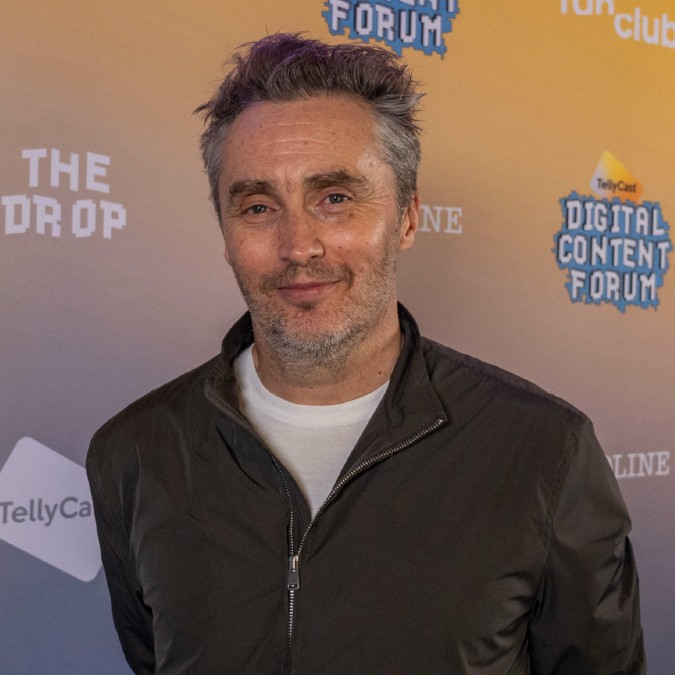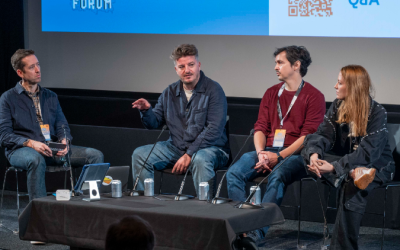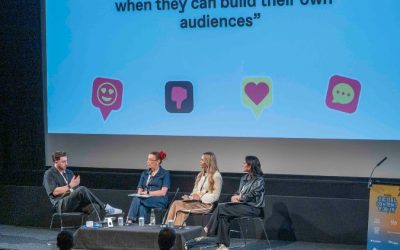Sora, Veo, Moonvalley, Runway, Synthesia… The list of GenAI video tools disrupting the production world gets longer by the month. And the arguments they spark around copyright, moderation and the value of human creativity continue to rage too.
At TellyCast’s Digital Content Forum 2025 today, Oxford University’s Dr Alex Connock, author of Media Management and Artificial Intelligence, offered his views – including some deliberately provocative ones – on the implications.
“Perhaps as an industry, we’re thinking a bit small about AI,” he said. “We think the content business is pretty simple. You make great stuff, and if people watch it, you win. But things have changed…”
Connock suggested that the TV and digital-content industries are still thinking about AI predominantly in “can we run this factory more efficiently” ways, when he thinks they should be thinking about how it can unlock creative ideas that weren’t possible before.
“AI is not just this reductive workflow improvement process… it’s this paradigm-shifting opportunity. There are more things in AI than we can possibly have dreamt of,” he said, before acknowledging that “it is pretty dystopian as well”.
He described the current moment as one where “we must disrupt ourselves… You don’t want to die because, by force of habit, you continue doing the old thing.”
“Stop AI is not a viable strategy,” he continued. “Even if you were to stop AI, the company next door is not stopping AI, and you would be ceding a cost advantage to that company.”
“Stopping is also risky,” added Connock, who suggested that in many internal meetings when people are pushing to make more use of GenAI technologies, it’s often “the lawyer sitting in the corner” who stops them.
“That’s the thing to say to the lawyer: ‘If you want this business to survive, you have to take risks, otherwise the risks will be taken around you’”
Connock suggested that things are changing, however, noting that when he visited TV companies a year ago, the AI team would often be located in the basement.
“Now when you go, quite often you will find the AI team right in the middle. In some Hollywood studios they are right outside the chief executive’s office,” he said.
In his talk, Connock had some encouragement for humans, suggesting that they think about what they do that AI doesn’t. AI can make an infinite volume of content for “no cost” (he did not mention the environmental costs, though) and while it’s “pretty good” quality, by definition it is derivative.
As for humans: “We are high cost, limited volume, original and great! And we need to be great, because if you’re not great, AI can do it better,” he said, suggesting that humans need to reframe themselves as “luxury goods”.
“We should be much, much more sophisticated about how we deploy AI,” he said. “You need to be sequencing the workflow so that the things AI does really well, it does, and the things you do really well, you do… There is a whole new realm of creativity that we could investigate where the human is partnered with the AI.”
Connock went on to call for the industry to embrace agentic AI technology – AI agents – and amused the TellyCast audience with his pitch for a “gardening agent” trained on TV veteran Alan Titchmarsh.
“When someone at home is swatching Alan Titchmarsh on TV, they could simultaneously on their iPad b having a one-on-one conversation with [AI] Alan Titchmarsh where he is redesigning their garden for them…. and the recommendations could be monetised by affiliate marketing”.
Connock also suggested that academic research can be a “goldmine for content ideas” citing the example of a Chinese study on removing the water from underwater footage, and other research on using machine learning to translate the calls of animals. Both of which could drive fascinating formats.
However, his conclusion may meet a mixed response from the TV world, as Connock tore into the demands being made by the creative industries for copyright to be respected by GenAI companies.
“Thee’s too much facile thinking going on at the moment: people saying ‘they’re just ripping off our content’,” he said. “But actually everyone’s wrestling with how do we manage intellectual property in this world?”
“The government cannot agree to the ludicrous demands that we’re making. We are in a geopolitical fight for our lives,” he continued, citing the investment being made in AI by countries around the world, and the UK’s need to keep pace.
“We cannot lose that fight as an economy, as a country,” he said. “We can’t say: send all the AI companies away.”





